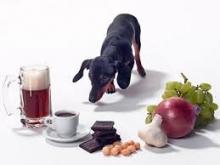Most pet owners now know that chocolate can be toxic to dogs, causing nausea, vomiting and diarrhoea, abnormal heart rhythms and occasionally death but there are many other “hidden threats” lurking at home.
Chocolate contains theobromine and caffeine, which are both methylxanthines. The amount of methylxanthines present depends on the type of chocolate. The darker the chocolate generally the more toxic it maybe. Chocolate can cause nerve stimulation, rapid heart rate, tremors and potentially seizures.
Grapes, sultanas and raisins are unsuitable treats for dogs as they can cause kidney failure. Some dogs are more susceptible than others but all dogs should see the vet if they have eaten any of these items.
Human Anti-inflammatories (Ibuprofen, Naproxen) these human cold and arthritis treatments are particularly toxic to dogs and cats and can cause vomiting, diarrhoea, gastric ulceration and kidney failure.
Rodent bait – Dogs often mistakenly eat rat or mouse bait leading to potentially life-threatening bleeding disorders and bruising but maybe reversible if caught in time.
Slug Bait – Frequently dogs eat slug bait put down by keen gardeners, this is metabolised into an agent that is toxic to the nervous system and causes muscle tremors, ataxia (lack of coordination) and seizures.
Lilies - These are very poisonous to cats and can cause kidney failure. It appears that all parts of the plant are poisonous to cats. Chewing leaves, flowers or small exposure to the pollen can be potentially very dangerous, and lead to kidney failure.
Artificial sweetener - Xylitol is a common sugar substitute, especially when it comes to sugarless gum, toothpaste, and more recently some brands of peanut butter. It can, at surprisingly low doses cause blood sugar level to plummet which can cause seizures and at higher doses cause severe liver damage.
Antifreeze – coming into winter season and topping up antifreeze in car radiators can see a rise in poisonings. Spills licked from the floor could be enough to cause intoxication. Signs include vomiting, depression, weakness and progress to kidney failure. Treatment is often very difficult.
The most important thing to remember is not to wait for clinical signs of poisoning to develop – seek veterinary advice immediately if you think your pet has eaten something toxic - call St Boniface Vets 24hours a day, 7 days a week 01363 772860 (out of hours, you will be connected directly to a vet).


